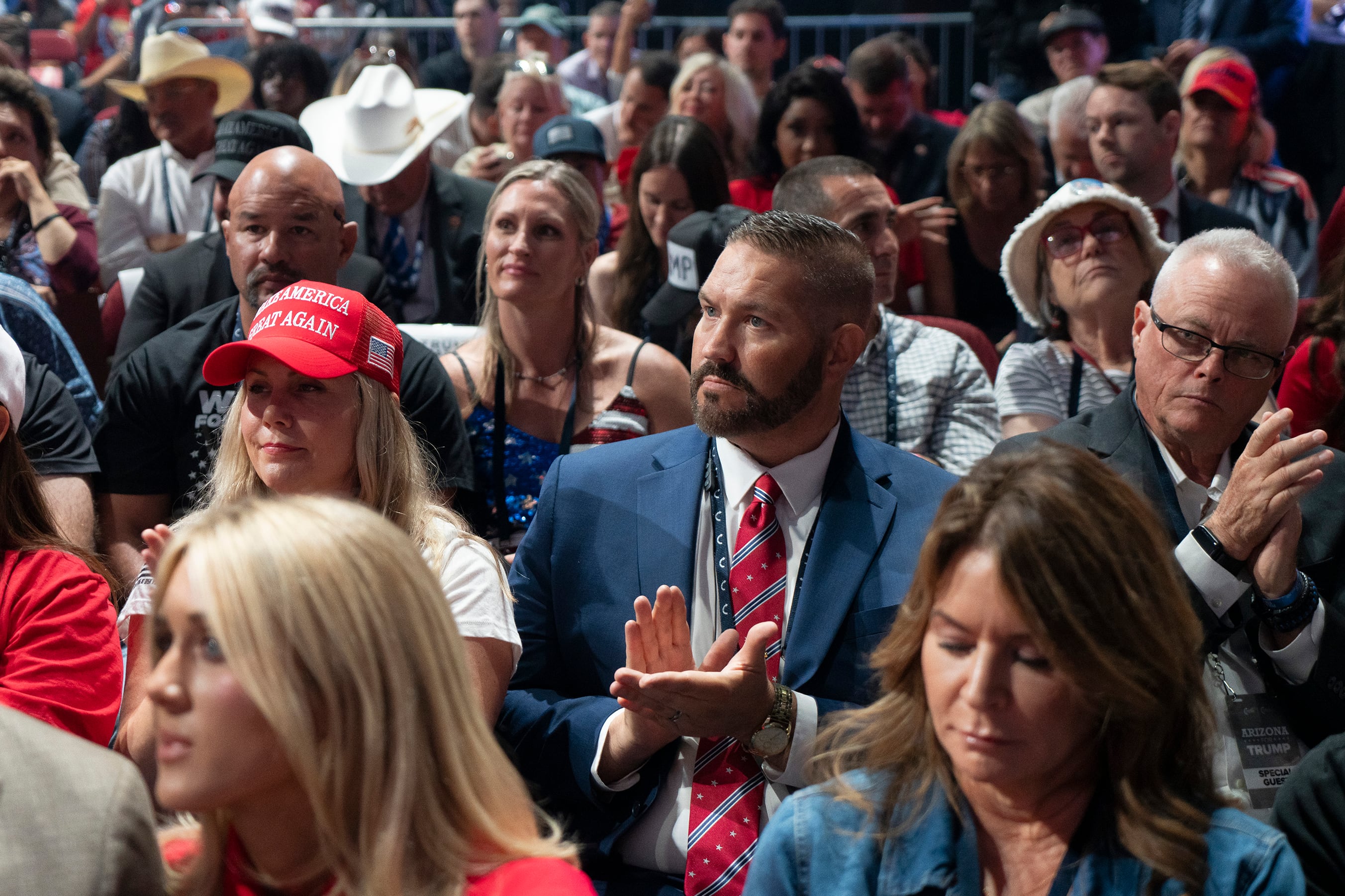Votebeat is a nonprofit news organization reporting on voting access and election administration across the U.S. Sign up for Votebeat Arizona’s free newsletter here.
Maricopa County Recorder Justin Heap has released text messages that he exchanged with county supervisors on his personal phone that show how he privately pressured them for more control over elections.
Heap provided the messages to Votebeat on Sept. 12 in response to an April public records request, after his office initially said that he didn’t discuss county business on his personal phone, and then said the texts he exchanged were unrecoverable.
The dozens of texts he released confirm previous reporting about how he privately pressured supervisors to support him as he tried to negotiate for greater control over the county’s elections.
Although the messages provide little new information about that effort, the monthslong, contentious process to get them shows that Heap, who is in charge of keeping property records such as deeds as well as voter registration records, at least initially failed to properly maintain key public records related to his oversight of elections.
The release of the messages came only after Heap’s office initially said he had “no responsive records,” and then said that his phone had been damaged and that he couldn’t recover them, resulting in lengthy negotiations between lawyers for Votebeat, the county, and, eventually, an outside lawyer Heap hired to represent him.
The back-and-forth came at taxpayer expense. A spokesperson for the Maricopa County Attorney’s Office confirmed that the county attorney had approved Heap’s use of outside counsel, criminal-defense attorney Barry Mitchell, to represent him, and that the county will cover the cost.
Heap did not respond to two emails sent through Mitchell requesting comment for this article and responses to specific questions about its findings.
Conflict escalated as Heap negotiated with supervisors over election authority
Votebeat requested the records to see the conversations public officials were having behind the scenes as they fought over control of the county’s elections. At stake are key election processes, such as who runs early in-person voting, and who controls IT staff and maintenance of election-related IT services.
Before taking office in January, Heap, a Republican, had criticized the county’s elections, calling them a “laughingstock.” That put him at odds with Supervisors Chairman Thomas Galvin, also a Republican, who has been on the board since 2021 and has defended the county’s elections, while saying he is open to improvement.
Heap and the supervisors held months of private meetings to resolve the dispute over election authority. But in June, Heap sued, and shortly afterward, the supervisors countersued. The battle is now pending in court.
On April 23, as negotiations between Heap and county supervisors broke down, Votebeat submitted a public records request to Heap’s office and the supervisors, requesting any messages they exchanged as they negotiated.
Votebeat also requested records from Heap and from select state lawmakers on any discussions they had during that time involving the agreement with supervisors over election law duties. The lawmakers responded that their records were either exempt from disclosure laws because of legislative privilege, or that they had no responsive records.
The supervisors released the responsive texts to Votebeat over the next few months.
But staff at the recorder’s office told Votebeat on May 13 that Heap had “no responsive records” to satisfy the request. When asked if Heap’s personal cellphone was searched, an official replied that Heap uses his county phone for “work of the office.”
The process that led to the release of Heap’s messages to Votebeat
Votebeat received no additional response, despite multiple requests. On June 23, a lawyer representing Votebeat, Matthew Kelley of the firm Ballard Spahr, wrote to Heap’s office, warning that a failure to provide the records violated Arizona’s Public Records Law.
On July 1, Joseph La Rue, a lawyer for the county, replied that Heap intended “to promptly fulfill” the request, but would require an extension until July 14. Votebeat received additional responsive records in the interim from Supervisor Debbie Lesko that included a text from Heap.
“Hopefully you and I don’t receive Public Recorders Requests from journalists for our personal cell phones tomorrow,” Heap had written on April 24, meaning public records requests.
Votebeat had submitted its request the day before.
By July 28, Votebeat had still not received records from Heap, and Kelley wrote again to La Rue, saying that the text exchange between Heap and Lesko “makes clear that Mr. Heap is knowingly withholding public records.”
On July 31, La Rue emailed Kelley providing four screenshots of text messages, all dated after May 14. La Rue said that other texts were not recoverable because Heap’s personal phone had been “substantially damaged and replaced in early May.” This was the first time Heap’s office indicated that the phone had been damaged and that the requested texts had been lost.
In response, Kelley pointed out that Votebeat submitted its records request in April, before the time Heap said the phone had been damaged.
Kelley reminded Heap that he had a statutory obligation to “carefully secure, protect and preserve public records from deterioration, mutilation, loss or destruction,” and that knowing destruction of a public record by a public official is a Class 4 felony in Arizona. Kelley asked if backup copies of the texts exist, and what efforts had been made to recover the lost records.
On Aug. 7, Mitchell, the criminal-defense lawyer, reached out to Kelley to say he, rather than the county attorney’s office, was now representing Heap in the matter.
On Aug. 18, Mitchell told Kelley that he and Heap were in the process of “determining how the phone can be repaired,” sent a list of potentially responsive texts from a log provided by Heap’s mobile carrier, and continued to update him on the status of the phone repair and the search for records.
On Sept. 12, Mitchell sent Votebeat copies of about 135 texts.
They included some text messages exchanged with state Rep. Alex Kolodin that involved matters other than the election agreement with supervisors, including on state election law. Mitchell said Heap had provided some texts “that are not public records to provide context, show good faith, and — we hope — engender some goodwill.”
Mitchell said that Heap had no responsive records in response to a request for messages exchanged using apps such as Signal or Telegram.
Told about the process of obtaining the texts, former Recorder Stephen Richer, whom Heap defeated in the 2024 Republican primary, said in a text message that his team took pride in quickly providing requested records, and “never had to have a criminal defense attorney assist with public records requests.”
What the texts released by supervisors showed
The texts previously provided to Votebeat by Lesko and Republican Supervisor Mark Stewart showed how Heap had pressured them to go around Supervisors Chairman Thomas Galvin during the negotiations and instead work with the lone Democrat on the board, Steve Gallardo, to approve the elections agreement Heap wanted.
According to the texts, Heap said he had gained Gallardo’s support for the deal, known as a shared services agreement, or SSA.
“Don’t ask me the kind of backchanneling and arm twisting I had to do to get the democrat on the Board, but he will vote for the SSA I proposed with you and Debbie,” he texted Stewart in March.
Gallardo later told Votebeat that he never agreed to support Heap’s proposal, and called the claim “total lies.” Gallardo has since asked the state attorney general to investigate Heap on suspicion of public corruption over his claims in the texts.
One new text to supervisors chairman provided
The messages Heap provided on Sept. 12 included his copies of the texts the supervisors had turned over, plus at least one additional message: from Heap to Galvin.
It was sent the day 12 News reported that Heap had discussed trying to remove Galvin as board chair, an allegation that Votebeat did not directly confirm.
“I learned this morning that apparently I’m part of ‘a plan to oust you as Chairman,’” Heap wrote in the text to Galvin. “That is not the case.”
Heap explained in the message that he had recently attended a political club meeting and had talked there about his frustration with the supervisors over the shared service agreement, but wrote that “it was not targeted at you specifically and there was no call to action.”
Galvin did not respond to Heap, according to the records.
Asked why he didn’t provide the text Heap had sent him in response to Votebeat’s records request, Galvin did not respond.
Contact Votebeat at az.tips@votebeat.org.




